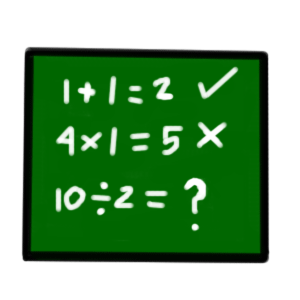“Why do I need to learn math? I’ll never use it!” is a question parents of middle and high school age children often hear. Non-math loving parents may struggle to answer that question, not fully convinced that math skills are actually important in the age of calculators and Apps. This post provides the answer. Quite simply, math skills develop the ability to solve complex problems. Life is complex. The ability to order the activities of the day is critical. Learning math leads to learning order.
First a confession - I’m a math lover. As a kid, I liked math because math is objective instead of subjective and my brain feeds on objective certainty. Subjective classes like Language Arts left me frustrated. Essays that I deemed masterpieces worth of an A+ were often returned with many red pen crossouts and re-writes, eventually led me to believe I was a lousy writer. As years passed, I turned my efforts towards math, which was, in my opinion, much more “fair” than subjective classes that required essays. In math, an answer is correct or incorrect; there isn’t much room for confusion or discussion. In hindsight, I wish someone would have encouraged me to work at BOTH - giving up the skill of writing to focus on math really wasn’t a good plan. But back to the point of this blog post….
Not everyone loves math. I know this very personally, because in my own family, my daughter is not a fan of math. In fact, she basically hates it for the same reasons I loved it. She feeds on the creativity of the subjective classes like language arts because there is no right or wrong answer. The red pen crossouts by her teacher on her essays don’t bother her in the least. It is her hatred of math that really got me to thinking, why do we learn math? I came to the conclusion that learning math is important for everyone, but not necessarily for the same reasons.
For those of us that like the concrete, right or wrong, objective nature of math, learning math is easy and rewarding. For kids like my daughter, the objective nature of math was a problem that must be overcome. Math had to reward her subjective, conceptual and creative learning needs. To do so, we had to change the appearance of all of her math workbooks and worksheets so that she can see the ORDER of her work. (Unfortunately there is never enough room for a child to complete all the needed computations in one place for each problem). Once we switched the focus from finding the correct answer to finding the PATTERN she used to find the right answer, I came to see what math teaches everyone - order. (I also came to see that math worksheets and books need to be reworked if we ever hope to engage children that are not naturally objective learners.)
So how does math lead to order? Math teaches us to order our actions in the manner necessary to obtain the correct answer. Math education begins by teaching one-step problems - the math facts - and developes complexity by moving to 2-step (two operators like addition then division), then 3-step problems (Add, divide, then determine what percentage) and so on. In higher math, it may take an entire notebook page of equations to get to the answer. As math complexity increases, the discipline of developing a step-by-step solution to a complex problem naturally results.
As an orthodontist, daily I put the discipline of developing step-by-step action plans for my patients to use. Much like a multistep math problem, every patient has a unique treatment plan that requires a series of steps executed at the proper time to obtain the proper end result. The many years spent crunching math problems was necessary to now allow me to solve complicated orthodontic problems in an orderly and predictable manner.
Fortunately for non-math lovers, the discipline of ordering your actions does not require an advanced degree in math. Most of life doesn’t demand the type of complex ordering of events like that of orthodontic treatment, but some level of organizational skills certainly help. That is where sticking with math through high school comes in handy. Algebra, Calculus, and Geometry will all develop the skills necessary to order actions and solve complex problems.
As a math lover, it is my hope to pass on the love of the order of math to my daughter and to any non-math lovers who may read this post.

